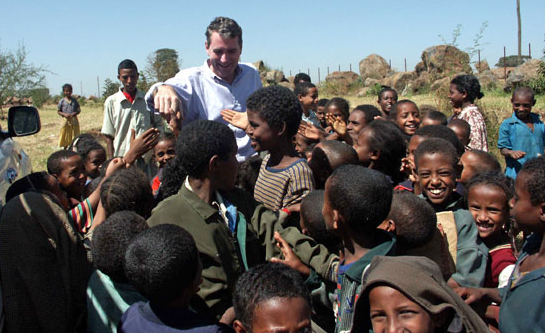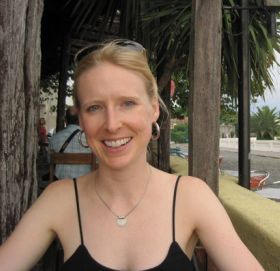nonprofits
Daily Dose Changemakers Series
Once a week this summer, come back to The Causemopolitan to read a guest post that will inspire you right up out of your seat to get involved and give back in a special series called Cause It’s Summer! Featured bloggers will be sharing their own reflections and stories, tips and resources, and perspective on philanthropy, social entrepreneurship and their own cause-filled life. This week welcome Olivia Khalili, as she shares six stories of people and companies that are doing good in the world, despite all odds. The stories are inspirational, and also true testaments to the strength of the human spirit.
Most of the time I forget to be inspired by myself. Hang on, I’m anything but immodest, but that’s just my point. We’re comfortable with drawing inspiration from others, but don’t usually tap our own stores of experiences and learning. So before I share some of the people and projects that inspire me, I’m taking a minute to silently include myself, to put to use the lessons learned from my life of gaffs and victories and tamed uncertainties—and I think you should do the same.
Much of my time is focused on using business to positively affect society. This puts me in contact with social entrepreneurs, homespun do-gooders, professional changemakers and many types in between. I’d like to share some of my favorite inspirations whom you might not yet have heard of, and offer them up as a potential inspiration for you too.
Philip Rosedale Philip is the founder and CEO of Linden Lab (the maker of Second Life). Every quarter, he sends his employees a quick questionnaire asking:
“Do you want to keep me or find a new CEO? Over the last three months, did I get better at this job or worse? Why?”
Voting is anonymous. Rosedale shares answers to the first two questions with the entire company. Overtime, as responses indicated that it was becoming increasingly difficult for Rosedale to improve, he tapped a successor (that was last fall; this past June he rejoined as CEO). I’m inspired by Rosedale because he routinely opened himself up for criticism. He held the success of his company in higher regard than his own success and ego.
Joyce Lavalle A sales director named Joyce LaValle left a copy of Paul Hawken’s The Ecology of Commerce on her CEO’s desk, which led to a complete transformation of the company and the industrial carpet industry as a whole. Joyce works with Ray Anderson, the founder and CEO of Interface Inc. Hawken’s ideas inspired Anderson to commit his company to zero waste by 2020 and alter the methods and resources it uses to produce carpet. Interface is well on the way toward its goal and has eliminated hundreds of millions of dollars in waste, as well as increased sales by more than $1 billion. Sixteen years later, Joyce heads the marketing for InterfaceFLOR.
John Wood Wood walked away from a swank Sydney flat, a relationship and a salary and identity he enjoyed as a Microsoft executive to build and stock libraries in Nepal. Wood’s the founder of Room to Read, which now also builds classrooms and computer labs and endows scholarships for girls in India and parts of African and Asia. While traveling, he observed that it doesn’t often require much money to significantly alter a child’s trajectory. Room to Read has built 10,000 libraries, more than 1,000 schools, distributed 7.4 million books and given 9,000 girls scholarships. Reading his book, Leaving Microsoft to Change the World, changed the way I give. I now look for more direct impact opportunities and organizations that facilitate them. I’m more optimistic about the real possibility for change in developing economies. I’m more focused on causes, campaigns and donations that make a damn of difference. Less hoopla, more impact.
Mukhtar Mai Mukhtar Mai grew up in Southern Punjab, Pakistan. When her brother was wrongly accused of fornification, she went to court to argue on his behalf. As a form of honor revenge, village tribesmen ordered her to be gang-raped. Custom dictates that rape victims commit suicide to spare their families the humiliation, but instead Mai she spoke up and demanded prosecution, gaining attention from her government and the international media. As compensation, President Pervez Musharraf sent Mai $8,300, which she used to start an elementary school for girls. Today, she runs Mukhtar Mai's Women Welfare Organization (MMWWO) to educate girls and teach the community about human rights and gender issues. MMWWO now includes a school, women’s resource center and shelter for battered women. Mai lives in constant danger of being attacked for the humiliation she’s seen to have brought on Pakistan and her schools and centers have been raided by the local government.
Wilbert Rideau In 1961, Wilbert Rideau, an African American, shot a female bank teller during a fumbled robbery. He was convicted and lived on death row from the age of 19-31 in Louisiana’s maximum security prison, Angola. In 1972 (after changes to the way the death penalty is practiced) he received life in prison. After an initial race-based rejection from the prison’s magazine, The Angolite, Rideau became editor of the magazine, reporting on the prison’s barbarities and injustices for 25 years. He took full responsibility for his crime and was deemed rehabilitated by many. In 2000 he was retried and freed. He says that prison, where he discovered reading and writing, saved him. "I lived like a reporter and had a mission in life…. And despite everything else, it gave my life meaning.” Rideau inspires me because he used books to transform his life and facilitate prison reform. His perspective is honest, but not vengeful. He has a new memoir, In Place of Justice.
LivingGoods Using the Avon model of franchised door-to-door selling, LivingGoods is turning women in Uganda into health promoters who sell essential, affordable healthcare products in their communities. LivingGoods’ work has brought economic opportunities for women and reduced levels of infant mortality, malaria and TB in the communities where it works. The organization is brilliant in its model and tag-team approach to two of Africa’s most serious handicaps—poor health and the underdevelopment of the female economic sector.
Olivia is the founder of CauseCapitalism.com. She works with companies to grow their businesses by implementing a social mission and speaks to entrepreneurs and businesses about the power of socially driven business. Prior to Cause Capitalism, she created Intent.com's advertising and content networks. Before getting hooked in the start-up world, Olivia helped Los Angeles nonprofits build capacity and earn funding. She worked for the U.S. Chamber of Commerce on international trade advocacy before moving to the Marshall Islands for a year to work for the Ministry of Education and write about international development. Olivia graduated from the University of Pennsylvania with a degree in International Relations and French and is now living in Buenos Aires as a digital transplant and committed vegetarian.


